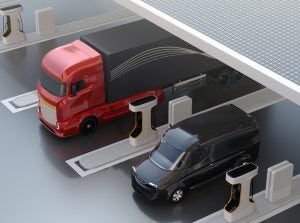 Two New Jersey gas utilities owned by South Jersey Industries, SJI,— South Jersey Gas and Elizabethtown Gas — are petitioning the New Jersey Board of Public Utilities, BPU, for approval to be acquired by JP Morgan-backed investment firm IIF. The companies’ proposal relies on a business model of continued expansion of the natural gas distribution system, and suggests that decarbonization can be achieved by blending hydrogen and biomethane into gas pipelines. But increasing gas use is not aligned with state climate policy, and the proposed blending options are not assured climate solutions. The BPU should impose conditions on the proposed transaction to ensure consistency with state climate goals. Additionally, all New Jersey policymakers must recognize the importance of avoiding wasteful investments in gas system expansion — in particular, legislation promoting gas utility spending on biomethane and hydrogen raises serious concerns.
Two New Jersey gas utilities owned by South Jersey Industries, SJI,— South Jersey Gas and Elizabethtown Gas — are petitioning the New Jersey Board of Public Utilities, BPU, for approval to be acquired by JP Morgan-backed investment firm IIF. The companies’ proposal relies on a business model of continued expansion of the natural gas distribution system, and suggests that decarbonization can be achieved by blending hydrogen and biomethane into gas pipelines. But increasing gas use is not aligned with state climate policy, and the proposed blending options are not assured climate solutions. The BPU should impose conditions on the proposed transaction to ensure consistency with state climate goals. Additionally, all New Jersey policymakers must recognize the importance of avoiding wasteful investments in gas system expansion — in particular, legislation promoting gas utility spending on biomethane and hydrogen raises serious concerns.
Energy Exchange
Proposed Acquisition of New Jersey Utilities Must be Consistent with Climate Goals
New Jersey BPU must help natural gas utilities comply with state’s Global Warming Response Act
 By Ted Kelly
By Ted Kelly
The need to replace South Jersey’s leaking and leak-prone pipelines while planning to move New Jersey’s energy system away from fossil fuels became major news today when the Board of Public Utilities approved a settlement for the utility to address leaks in the gas system. South Jersey Gas is now one of the first utilities in the U.S. to commit to developing a plan to transition away from polluting energy sources and protect communities at high risk of methane pollution.
South Jersey Gas, state consumer advocates and regulators agreed on a way for the utility to use a data-informed approach to detect and repair or replace the biggest leaks and most at-risk pipelines in its jurisdiction. At the same time, South Jersey Gas will submit a plan, called the Climate Oriented Business Plan, which will outline how its business will evolve to meet federal and state decarbonization requirements in the long-term. This includes the selection of investments that comply with New Jersey’s Global Warming Response Act, which requires the state reduce its greenhouse gas emissions to 80% by 2050 with an interim goal of 50% by 2030.
An all-inclusive way to look at energy transition in New Jersey
 By Elizabeth B. Stein and Cole Jermyn
By Elizabeth B. Stein and Cole Jermyn
Update: On August 17th, the BPU voted to accept the final version of the Ratepayer Impact Study. The final version has the same limitations EDF and others identified in comments on the proposed study, including not accounting for the environmental and public health benefits of the energy transition, and failing to fully account for modernized utility practices that can minimize costs such as innovative price signals and grid modernization. But even with these limitations, the final study shows that electrification is the pathway to both lower costs and less greenhouse gas pollution.
By 2030, New Jersey ratepayers who adopt electric vehicles, electrify their buildings and improve their energy efficiency will see lower energy costs than both their fossil fuel-reliant neighbor and the average customer today. This is true for small and large commercial customers, residential customers and low-income residential customers. These results should be a wakeup call to ensure all customers can afford to deploy these technologies in order to meet the state’s environmental and energy affordability goals.
New Jersey, like many other states, has been hard at work developing a strategy to drastically reduce its own climate impact. The state’s residents are already experiencing more than their share of climate change. With 130 miles of coastline, including population centers near much-loved beaches, more frequent extreme weather events are an existential threat to the state.
The state’s Energy Master Plan identifies and coordinates efforts, in various parts of the economy, to achieve a sustainable pathway to substantial decarbonization by 2050. But a new study, proposed by the New Jersey Board of Public Utilities, that seeks to estimate the financial impact of these efforts to eliminate fossil fuels on gas and electric utility customers, is infected with methodological flaws and faulty assumptions that would put it out of step with the state’s energy and climate policy.
Smart charging should be integral part of a national EV charging network
 Electric trucks are coming, and they’re coming fast. Just before 2021 drew to a close, New Jersey, New York and Massachusetts joined California, Oregon and Washington to accelerate the adoption of zero-emission trucks with the adoption of the Advanced Clean Truck program. The U.S. House of Representatives passed the Build Back Better Act and the Infrastructure Investment and Jobs Act, securing up to $67 billion in direct investment in zero-emission trucks and buses, as well as several critical tax credits to support the purchase and production of zero-emission trucks. And more than 150 truck fleets are either operating zero-emission trucks or have trucks on order.
Electric trucks are coming, and they’re coming fast. Just before 2021 drew to a close, New Jersey, New York and Massachusetts joined California, Oregon and Washington to accelerate the adoption of zero-emission trucks with the adoption of the Advanced Clean Truck program. The U.S. House of Representatives passed the Build Back Better Act and the Infrastructure Investment and Jobs Act, securing up to $67 billion in direct investment in zero-emission trucks and buses, as well as several critical tax credits to support the purchase and production of zero-emission trucks. And more than 150 truck fleets are either operating zero-emission trucks or have trucks on order.
New Jersey BPU’s electric truck and bus charging infrastructure proposal: A solid first step but more is needed
 By Elizabeth B. Stein and Pamela MacDougall
By Elizabeth B. Stein and Pamela MacDougall
New Jersey’s march toward electric trucks and buses has picked up speed in the last few years. This summer, the New Jersey Board of Public Utilities released a preliminary proposal outlining the development of charging infrastructure for medium- and heavy-duty vehicles throughout the state, inviting stakeholders to participate in public discussions and provide written comments. This straw proposal has incredible potential to ready New Jersey for the coming wave of electric buses and trucks and to accelerate and build on existing progress.
Environmental Defense Fund filed written comments on this proposal yesterday. The takeaway? Though it sets the stage for some progress, the straw proposal has some gaps that suggest the BPU’s vision for electrifying trucks and buses misses key public benefits and some fundamental realities of how the transformation will occur. As written, it limits the potential and power of a well-calibrated BPU framework for electrifying the sector and risks undermining New Jersey’s climate, clean energy, equity and economic goals.
IKEA tests new model for accelerating electric delivery
Consumer preference for at-home delivery is on the rise, and with it, the need for more trucks on the road. Transportation is now the leading source of greenhouse gas emissions, and trucks — though making up only less than 5% of vehicles on the road — are responsible for over half of smog pollution. And yet, corporate progress on zero-emission shipping remains slow.
Electric Vehicle Sponsorship Models are a new, innovative opportunity that companies can use today to hit their climate goals. Through this mechanism, companies can ensure their items ship on EVs, even when they don’t own or manage their own delivery vehicles.
This past spring, IKEA piloted a first-ever sponsorship model to meet its goal of 100% zero emission home deliveries by 2025. Today, a fleet of 25 electric vehicles carrying IKEA products are servicing all five boroughs of the New York City market.
